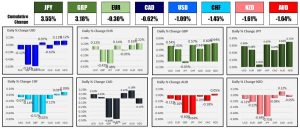Among major currencies, the JPY is the strongest and the AUD the weakest. The US dollar, which had been the weakest of the majors at the start of the day, showed some improvement throughout the US trading session, but it is still trading lower overall due to losses against the British pound (-0.54%) and the Japanese yen (-0.68%). Dollar gains against CHF, AUD, and NZD ranged from 0.07% to 0.12% by market close.
Today in the world of economics:
- Dallas Fed Manufacturing Index dropped to -28.1 in May 2023 from -23.4 in April 2023. Both the rate of increase in new orders and the rate of growth in total orders have dropped to their lowest levels since the middle of 2020. Manufacturing activity has slowed, and output has fallen marginally as a result. Nonetheless, the labor market showed hints of resilience, with sustained employment growth, and the future production index indicated a probable recovery.
- In May 2023, the US Consumer Confidence Index scored 102.3, which was higher than the predicted 99.0. Slightly lower than the corrected previous value of 103.7, but still indicative of consumers’ optimistic view. Consumer confidence in the present market circumstances, as measured by the Present Situation Index, decreased to 148.6 from 151.8. The Expectations Index, a measure of the near-term forecast for income, company, and employment, also fell slightly, from 71.7 to 71.5.
- The Case-Shiller 20-city index for March 2023 showed a month-over-month gain of 0.5%, which was higher than the predicted 0.0% increase. This information implies that the real estate market in these 20 cities is strengthening, since it represents an increase from the previous year-over-year result of +0.1%. But even with this month-over-month improvement, the index still fell 1.1% from a year ago, which is less than the -1.6% dip that was forecasted.
Today, Federal Reserve official Robert Barkin spoke out in favor of keeping interest rates at a “neutral, normal” level for an extended length of time. He admitted that the economy is sending conflicting signals, with some areas showing signs of slowing down while others remained robust. He pointed out that many companies are trying to raise prices and will keep doing so until demand decreases. Barkin stated that inflation would be more tenacious “than many people would hope,” and he has noticed less concern expressed about the potential danger posed by wage increases. Despite increased scrutiny, he said, the volume of bank loans has held steady. U.S. Treasury securities exhibited slight improvement (lower rates) in response to Barkin’s remarks, but the implied probability of a 25 basis point rate hike in June has remained around 60%.
After a weekend of negotiations, a debt ceiling agreement was reached, and attention shifted to securing the necessary votes for its passage. Naturally, there are a variety of points of view being discussed in the White House and Congress on the debt ceiling. The White House Budget Director has urged congressional action to raise the debt ceiling by June 5th, arguing that the x-date is highly unlikely to be extended. Adeyemo, the US deputy secretary of the treasury, agreed, calling the agreement a “good faith compromise” to avoid a financial default. Schumer, who is the majority leader in the Senate, has shown his approval of the agreement and promised a speedy vote, and Jeffries, who is the leader of the Democrats in the House, has informed us that the Democrats will do all in their power to see the law through. However, there was some disagreement; Representative Jayapal expressed doubts about certain parts of the debt accord and suggested that the Republicans did not secure any major concessions from the Democrats on spending. Despite this, Republican Debt Negotiator McHenry and House Speaker McCarthy both said they were confident in the bill’s chances of passing with Republican backing. On the other hand, Representative Dan Bishop and the House Freedom Caucus made their disapproval of the debt deal and McCarthy’s leadership of the committee known by calling for a motion to dismiss McCarthy. It has been announced that Representatives Norman, Hunt, and Mace will vote against the debt ceiling bill. However, the agreement is still anticipated to be approved.

Today, the price of crude oil dropped dramatically. The underlying macroeconomic worries in China and the significant debt burden are raising concerns about future oil consumption, prompting the price of WTI crude to fall below the $70 mark. According to GasBuddy’s data, demand for gasoline in the United States dropped 1.1% from 2022 over the Memorial Day weekend, indicating a lackluster beginning to the summer driving season. Since Russia recently played down the possibility of action, which triggered a wave of selling, expectations for concrete results from OPEC’s JMMC meeting on June 4 are low. Trading at $69.79 per barrel, crude oil has dropped $-2.89, or -3.96%.
There was a variety of market activity during the last trading day. At its final tally, the Dow Jones Industrial Average (DJI) was down 0.15 points, at 33042.79. The S&P 500 (SPX) barely moved from its previous closing price of 42105.53. The tech-focused Nasdaq (IXIC), on the other hand, recorded modest gains, climbing 0.32 percent to a high of 13017.42 before retreating to a closing price of 13154.29.
With regards to specific stocks:
- Nvidia (NVDA) had a good day, with shares closing up 2.99% at $401.11.
- Microsoft (MSFT) stock dropped by 0.50% to finish at $331.21.
- Intel (INTC) rose by an impressive 3.41% to end the day at $29.99.
- Apple (AAPL) rose by the same margin, 1.11%, to end the day at $177.31.
- The stock price of Meta Platforms (META), formerly known as Facebook, rose by 0.18% to end the day at $262.52.
- With a gain of 1.32%, Amazon (AMZN) stock ended the day at $121.61.
- Costco (COST) finished the day up 0.15 percent, at 508.03.
Today’s closing tally on the European stock markets was mixed, while the US market saw gains. Both the Stoxx 600 and the German DAX had mild losses, falling by 0.3%. The FTSE 100 in the United Kingdom and the CAC 40 in France also fell by 1.4%, but by larger margins. In contrast, the MIB and IBEX indices in Italy and Spain respectively fell by 0.2%. The American market
Yields have dropped dramatically on the US debt market, as this picture shows:
- Return on investment over 2 years 4.462% -12.7 bps
- 3.8150% -13.50% 5 Year Note
- Bonds 10 Year 3.694% -12.6 bps
- A 30-year bond As a percentage, 3.895% -8.1 bps
Overseas Markets:
- Currently, the price of gold is $1959.42, down $15.56, or 0.80%. The market price dropped 3.17 percent in the past week.
- The price of silver rose today by 5.6 cents, or 0.24%, to $23.18.
- Bitcoin, which opened the US trading day just over the $28,000 barrier, has now retraced to the previous day’s low of $27,814.







